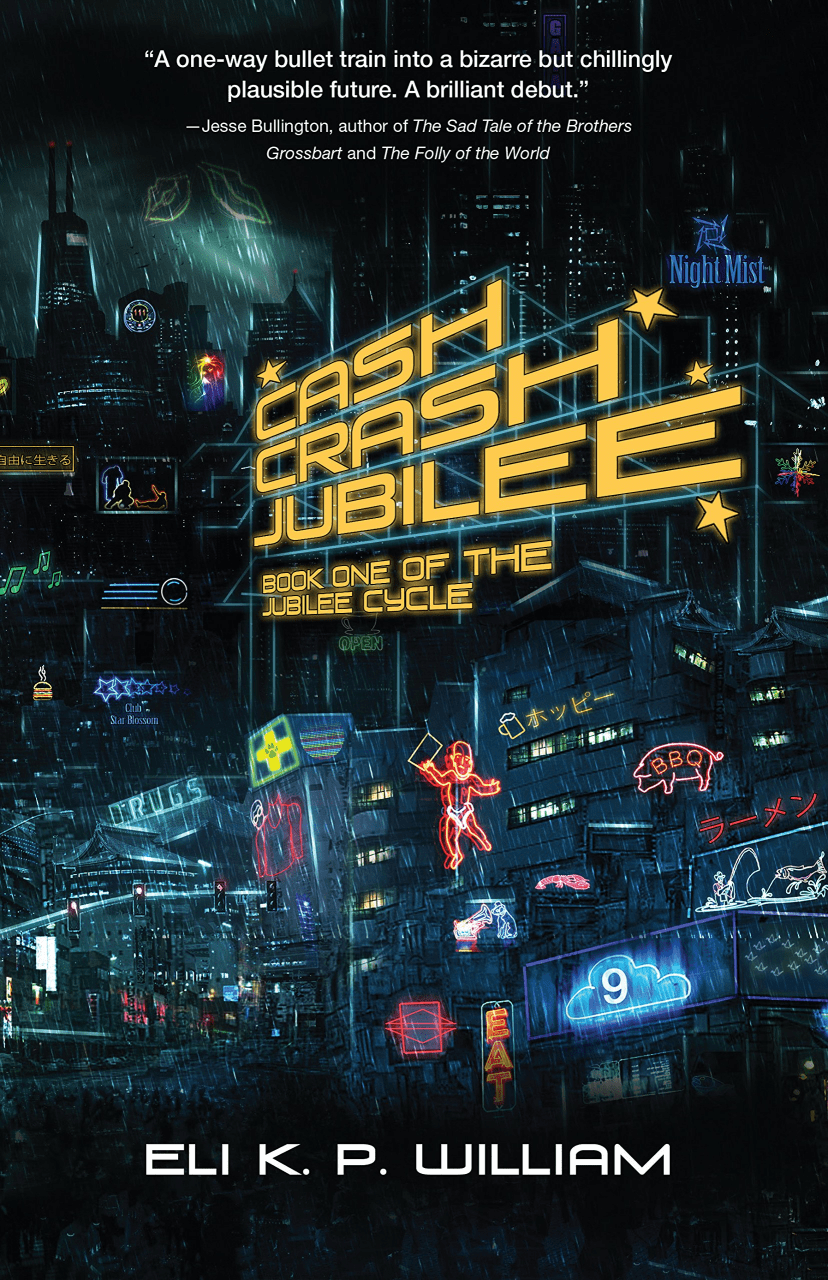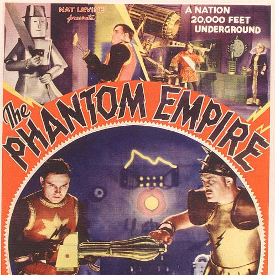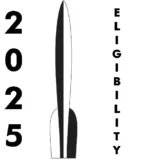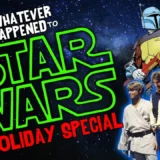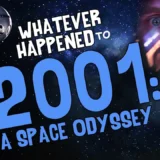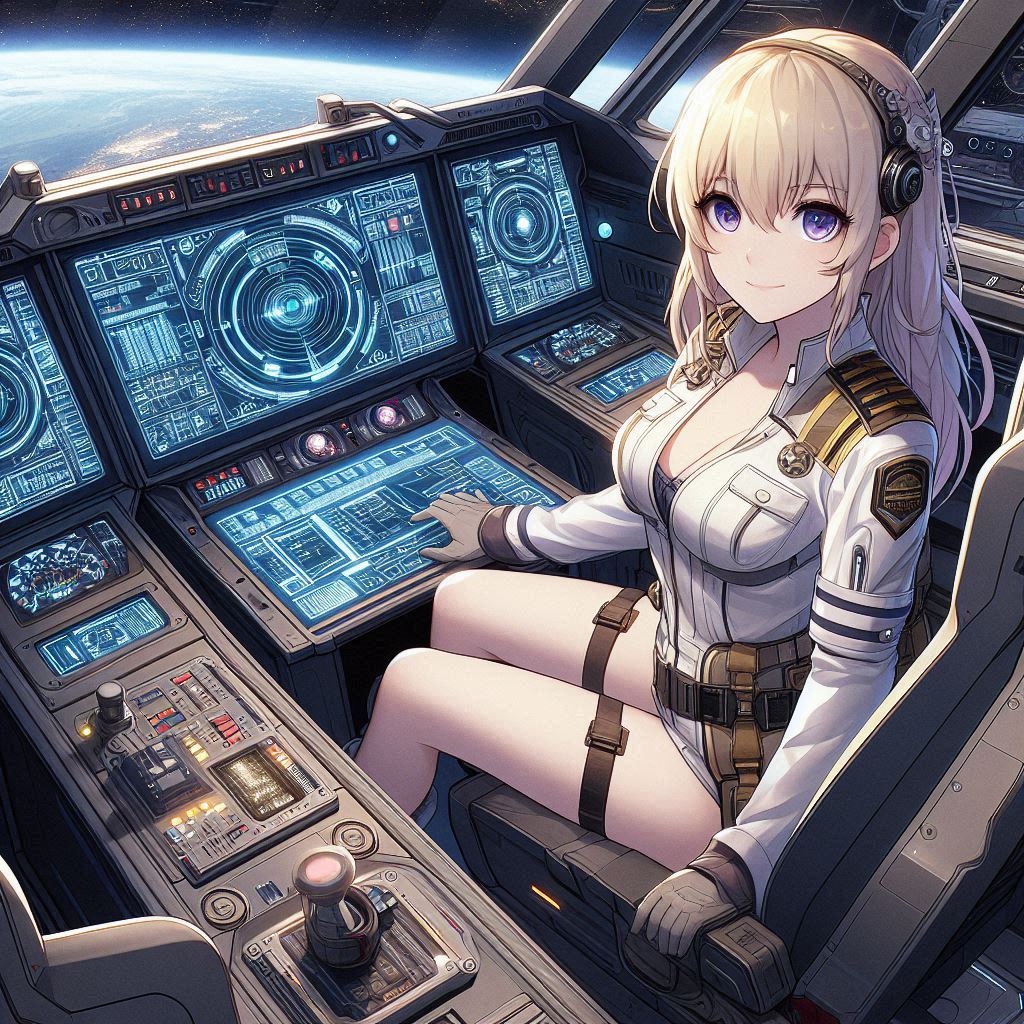
Our technology may go so far, it will send us out into the cosmos, and we might just run into ourselves. What do you think might happen here? Myself, I’m uncertain…
Captain Iris Froud propelled herself across the control room to the black-padded seat bolted to the deck before the main control panel. She strapped herself in and stared at the ship’s nameplate: Heisenberg. Two more seats flanked her. Above everything, a broad screen showed the ship’s surroundings, including the numerous lounge windows, cargo bays, and attachment points of Luna Orbital Station and the Technology Development Center. “’We expect no problems,’ they said. We just have to test it. Just have to push the big red button.” She pointed.
Between her control board and the navigator’s, on her left, the Tech Dev folks had jammed a new one. It had two screens, one labeled with an X, for location, the other with a P, for momentum. Below the X screen was a small keyboard. Between the screens was a big red button. Pushing it would activate the Uncertainty Drive.
“The Uncertainty Drive worked fine in the lab,” said Bin Tanka, Engines.
“Theory as sound as it can be,” said Navigator Adrian Franklin. He sounded skeptical.
“Theory!” said Captain Iris. Her lips peeled grimly back, revealing the pair of namesake lapis lazuli inlays in her upper incisors. When she caught someone staring, she would snarl with the spirit of the Viking ancestors who had brought the Froud name to the Orkney Islands: “Just in case I die, you know? Instant ID. Better than fillings.”
She was snarling now, too. “They aren’t so sure, are they? Or they wouldn’t be telling us to push that button so far from home.”
Adrian shook his head as he strapped into his seat. He was skeptical, but he didn’t want to be as pessimistic as his captain.
The last seat was Bin Tanka’s. Hanging from its side was his personal comp. He spent as much time as he could using it to create art, swearing every time its AI tried to take over the visions he was trying to render. Friends on other ships within the Solar System liked to display his work.
“I examined their reports, sers,” said the ship’s AI. It handled most routine functions, including conversion of the Solar System’s beacon-based coordinate system into distances and directions. “Proximity to excessive mass could pose problems.”
“’Go past the Kuiper Belt,’ they said. At least 75 AU. At least we don’t have to go to the Oort Cloud.” Adrian shook his head. “Long trip, even with the Fuchs drive.”
“Three weeks,” said Bin Tanka. “Damn good thing we have fusion power. It used to take a lot longer to go that far.”
“If this thing works,” said Captain Iris. “Next-gen will take three minutes.”
“But it worked in the lab,” said Adrian.
“’Excess of caution,’ they said. ‘Do the testing without extraneous factors.’”
“Clean-room testing,” said Bin Tanka.
“No clean room big enough for the Heisenberg.”
“Except space. Way-out space.”
“Yeah,” said Captain Iris. “We good, Bertie?”
“We are free from station, ser. Course is set. Fusion reactor nominal. No traffic.”
“Then let’s go, Bertie.”
The image on the broad viewscreen above the control panels shifted to keep Luna Orbital Station centered as it shrank, slowly at first, but then, as the Heisenberg accelerated, faster and faster. The Moon came into view, and it too was shrinking. They were on their way.
The screen image shifted again to show the empty space ahead. The system mass they had to avoid, planets and asteroids and smaller rocks, was sparsely distributed. They would be surprised if they saw anything, but they had to watch. Or Bertie did. The AI would let them know if any problems appeared in their path.
There were no rumblings of engines, no roar of rockets, not even a mild vibration of the deck. The ship’s Fuchs Drive was a kind of warp drive; the velocity it imparted to the ship depended on energy input. Of course, the ship could never exceed the speed of light.
The new drive, if it worked, would change that. It exploited Heisenberg’s Uncertainty Principle, which said it was impossible to measure a subatomic particle’s location, X, and momentum, P, simultaneously. If you knew one, the other was indeterminate. The physics whizzes had scaled it up to apply to large objects, like ships, and figured a way to specify a location. Just type in the coordinates, they said. And sure, you arrived going faster or slower than you started. The Fuchs drive could handle that.
#
Once, a trip to or past the Kuiper Belt would have taken years. Now they just had to look forward to three weeks of boredom before they could even think of testing the new Uncertainty Drive. But the Heisenberg’s crew had worked together long enough to be comfortable with each other. The Captain, for all her Viking ancestry, rarely stood on her rank.
The days of the voyage passed smoothly. They ate and slept. They read and played games. Bin Tanka concentrated on his art.
Bertie, on the other hand… Captain Iris and Adrian passed the time with endless games of chess in the small galley, and he had a tendency to kibbitz. That did not endear him to Iris and Adrian, especially since any move he suggested was generally the best one. His comments on Bin’s artwork were less apt, for art was not calculable.
“Shaddap, Bertie,” was a frequent refrain. Then, for a time, like a small child, he was quiet.
But the days passed. The weeks passed. The Heisenberg passed the orbits of Mars and Jupiter, of Saturn and Uranus and Neptune, even of still-demoted Pluto. It began to decelerate.
Eventually, the sun was little more than a bright pinprick in the sky. The Kuiper Belt had miniplanets and other masses, but they had deliberately chosen an empty zone. There was not even much in the way of dust. Nor would there be unless they went all the way to the Oort Cloud, a thousand times as far from the sun.
Adrian was sitting at the navigation station, leaning over the X-marked screen on the controls for the Uncertainty Drive. His fingers were poised over the small keyboard. “How far do we want to go first?”
“Try a hundred thousand kilometers,” said Captain Iris. “Baby steps.”
The navigator called the beacon chart onto the screen and began to type. A red dot appeared on the chart. He changed the zoom factor, and the dot became a short line. On one end, a dot marked the position of the Heisenberg.
“Ready,” he said as he reached toward the big red button on the Uncertainty Drive panel.
That was when Bertie said, “Wait!”
“What?” Adrian jerked his hand away from the button.
“There is an object, sers. Metal.” A yellow light began to blink on the big screen above the controls.
“I thought you said we were clear, Bertie.”
“It takes time to scan everything, sers. We should be clear. But we are not.”
“Obviously.”
“I am getting more data, sers.” The blinking light on the screen enlarged, and it was quickly clear that they were not looking at a rock.
“A ship,” said Bin Tanka in a hushed voice. “Aliens?”
Adrian leaned toward the screen as if that would help him see better. “We’ll need to report this.”
Captain Iris grimaced for the inevitable delay. Her dental inlays caught the light. “Get us closer then. Just the Fuchs Drive.”
It did not take long to get close enough to see that the unknown ship looked a lot like their own. It wasn’t a perfect match. The fusion reactor module was smaller. The flanks swelled as if the interior were a bit roomier than in their own ship. Changes in coloration announced that the ship had been repaired or refitted. Or both.
“I bet I know where the control room is,” said Adrian.
Captain Iris laughed. “You’re the navigator. Any signs of life, Bertie?”
The ship’s AI responded with, “The fusion reactor is inactive, sers. Hull temperature is forty Kelvin.”
“A derelict,” said Bin Tanka.
“It must be,” said the navigator. “It sure doesn’t belong out here. We’d know if a ship were missing.”
“Then is it alien?” asked Bin Tanka.
“It looks too much like ours.”
“Except it isn’t. And if it’s that cold inside…” Captain Iris shook her head. “No crew. No living crew.”
“The ship is not emitting signals, sers,” said Bertie. “It is not responding to my signals.”
“Then we will have to wear suits when we board.” Captain Iris pointed at the obvious access hatch. It was located precisely where it was on the Heisenberg.
“Board?” said the navigator. “We’re here just to test the Uncertainty Drive. We just need to get some distance and push the button.”
“Board,” repeated Captain Iris. “They’ll want to know all about it back home.”
The others nodded. Of course they would.
It did not take long to suit up, nor to move their ship close enough, just barely, to step across the gap. After telling Bertie to hold their ship close and record everything seen by the suit cams and transmitted by the coms, Adrian did precisely that, grasping the access hatch’s manual control in one hand. He braced himself against the hull and yanked. The hatch moved, and he said, “We’re in.”
The interior of the strange ship was utterly dark. There were no lights, not even the dim emergency lighting. They had to rely on their suit lights, but that was enough to show that even the inside of the ship was very much like their own. The air lock looked identical. The corridors and rooms beyond were laid out the same, although they were covered not with grey paint, but with a salmon-pink carpet frosted with a layer of frozen air. When they touched the carpet, pink dust erupted, hanging briefly in the zero-gee vacuum.
In the control room, the cabinets that supported the four control panels were larger. So were the screens. The bolted-down seats seemed identical, although the padding was cracked and the stuffing showed. On one wall was mounted a frame containing a chart of some kind; the glass protecting it was cloudy with carpet dust or, perhaps, with frozen air.
As on their own ship, one of the control panels bore two small screens labeled X and P and, between them, a big red button. Beneath the button was a third screen, labeled T.
“This is seriously spooky,” said Bin Tanka. His eyes were so wide behind his helmet’s faceplate that their whites underlined the sentiment. His suit com gave his voice a suitable quaver. “So much like ours!”
The others just nodded. Captain Iris pushed off the wall to float toward the central console. It reached higher on the wall than its equivalent in their own ship. As her course brought her face above its upper edge, she grabbed at the edge to halt her movement and swore.
“What?”
“Look at this!” When they were beside her, she pointed behind the top edge of the console.
Now it was the others’ turns to swear. “It can’t be!”
“Coincidence!”
“But it is.” A name plate, just like their own. Saying Heisenberg, just like their own.
“If it is, it’s older. It’s been refitted. And it’s old.” Bin pointed at the stuffing leaking from the seats.
“How can that be?” All three shook their heads.
“We need to look around,” said Captain Iris.
Their first stop was the galley, where they found only empty cabinets. There were drink bulbs and covered bowls for more solid food. But there was no sign of food.
“Was there a crew?” asked Captain Iris. “Or was it run by an AI?”
“Think its name was Bertie?”
She shook her head. “We need to split up.”
A few minutes later, Adrian shouted over his com: “You’ve got to see this!”
“Where are you?”
“Quarters. Room 2.”
On their own ship, that would be his own room. Here, there was no way to tell who slept in it. Particularly since all three members of the derelict’s crew were sprawled in the gravity-less, airless space above the deck, their ship suits shredded into less than rags. Once they had been brown, not blue like theirs.
“Skeletons!” Bin sounded shocked when he saw the bones the shred revealed.
The navigator pointed at a shin bone, where a thin white line marked a long-healed break. “I broke my leg like that when I was a kid.”
He then pointed at another, shorter skeleton, one of whose knees had been replaced with metal. “But these guys were older than us when they died.”
Captain Iris shrieked. She was staring at a skull whose incisors were inlaid with lapis lazuli irises. “That’s me! The teeth!”
“How the hell…” Even through his helmet, it was easy to tell that Adrian was shaking his head. “This is impossible.”
“But it’s right in front of me! Us.” Captain Iris sounded ready to shriek again.
“Are you getting this, Bertie?” said Bin Tanka.
“Of course, ser,” said the AI’s voice on their coms.
“We have to report this,” said Adrian as he led the retreat to the control room. There, he paused to rub his suit’s sleeve over the foggy glass of the chart on the wall. It helped a little.
“That’s a star chart,” said Bin Tanka.
“We should take it,” said the Captain. Her voice was shaking with the shock of seeing what had to be her own body. “Smash that glass.”
Adrian used his fist and rebounded from the wall. He hadn’t anchored himself first. But the glass shattered anyway, rendering the chart much more visible. It was indeed a star chart, and its labels were in a familiar alphabet. The words looked like they should be familiar, but they weren’t quite.
Once they were back on their own ship, he spread the chart across a wall, tacking its corners down with tape. “What are those?” asked Bin Tanka, pointing at a star system whose emblem was bright gold. There were many more highlighted in the same way. Beside each one was a string of perfectly normal numerals. “Coordinates?”
“Important systems?” asked the navigator. “Colonies?”
“Not ours,” said Captain Iris. Out of the suit at last, she was visibly quivering. “We don’t have colonies.”
“Yet,” said Bin Tanka. “This is from the future.”
“What?”
“What else could it be? Our own ship, but modified. Our own bodies, but older.”
“How the hell?”
“Momentum,” said Bertie, the ship’s AI. ”It is a function of mass and velocity, sers. Velocity is a function of distance and time.”
“So we’ve got a time machine,” said Captain Iris. “But how do you aim it? Can you pick a time?”
Adrian pointed at the big red button. “We can’t. The other ship has a T screen. Not just P and M. This one…” He shook his head. “We press that button and we’re off to the future. Some future.”
“Or the past,” said Captain Iris. “We came back, after all.”
“But why?” asked Bin Tanka. “They couldn’t leave us a note?”
“It’s probably on the computer,” said Adrian. “And no power.”
“Jokers,” said Captain Iris. “Damned jokers. They didn’t want us to know.”
“Logic says there must be a reason, sers,” said Bertie. “But something went wrong.”
“Yeah, we came back,” said Bin Tanka. “But how long ago? How long were we waiting for us to show up? We died. There’s no food because we ate it all.”
“Long enough for all the power to die.” Every ship with a fusion power plant had batteries to start the plant when needed. Meanwhile, they kept the lights on.
“Maybe we were already dead. And someone sent us back. Or their Bertie did it.” Adrian made a face. “Our Bertie? The pronouns can drive you nuts.”
“What do we do now?” asked Bin Tanka.
“We have to report,” said Captain Iris. “Send them a copy of that chart, too. And then they’ll go out and make those colonies. We have to push the button. And then we come back to make it all happen.”
Adrian shook his head. “We don’t have to push that button.”
“Yes, we do,” said Captain Iris. “If we don’t, we don’t go into the future to get the chart and bring it back. So humanity wastes a lot of time looking for good places to plant colonies. And the ship doesn’t come back for us to find it. So we push the button and go to the future and then the ship comes back later and…”
“Round and round,” said Adrian. “A causality loop. A paradox loop.”
“My head hurts,” said Bin Tanka.
“We really need to tell them the drive needs work before it’ll do what they want.”
“Yeah. Or they need a whole new kind of drive.”
“I don’t know,” said Captain Iris. “The ship was refitted, in the future, so it must be in use then. And we got old. Will get old. I bet the folks in the future fixed the drive.”
“Except the time travel part.”
“Or they just got that wrong when they came back.”
“It would help if the folks back home could come out here and collect it. See what was done.”
“Power up the reactor and fly it home.”
“That knee replacement.” Adrian looked at Bin Tanka. “It’s nice to know we’ll live to get old.”
“Hah,” said Captain Iris. “I guess we can’t mess with causation. Bertie, is our report ready to send? Does it say that ship must have an improved version of the Uncertainty Drive?”
“Yes, Captain,” said the AI’s voice.
“Then send it.” She pulled the belts on the command seat tight. “You two, strap in.”
“Done, ser.”
“Now press the button.” Bin Tanka grinned. “We are going to get in so much trouble.”
The navigator reached his thumb toward the big red button between the two screens, X and P, on the Uncertainty Drive control panel. X was still set for a tiny jump of a hundred thousand kilometers.
Captain Iris blocked his hand. “I’m the Captain. My responsibility. Especially if something goes wrong.”
Then she pressed the button.
FIN



